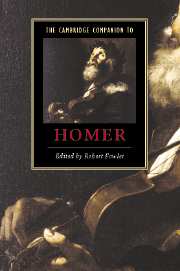Book contents
- Frontmatter
- 1 Introduction
- Part 1 The poems and their narrator
- Part 2 The characters
- Part 3 The poet’s craft
- 8 Formulas, metre and type-scenes
- 9 Similes and other likenesses
- 10 The speeches
- Part 4 Text and context
- Part 5 Homeric receptions
- Dateline
- List of works cited
- Index of passages discussed
- General Index
8 - Formulas, metre and type-scenes
from Part 3 - The poet’s craft
Published online by Cambridge University Press: 28 May 2006
- Frontmatter
- 1 Introduction
- Part 1 The poems and their narrator
- Part 2 The characters
- Part 3 The poet’s craft
- 8 Formulas, metre and type-scenes
- 9 Similes and other likenesses
- 10 The speeches
- Part 4 Text and context
- Part 5 Homeric receptions
- Dateline
- List of works cited
- Index of passages discussed
- General Index
Summary
Repetition in Homer
The idea that Homer was an oral poet composing in a tradition of formulaic language is one of the seminal concepts of twentieth-century scholarship. The major figure in the development of this idea was Milman Parry (1902-1935), though many other scholars have contributed to the theory. Parry built on earlier work, and it is fair to say that many elements of his theory had been stated previously; what was new was his way of combining these elements - and also the persuasiveness of his research, both in his close analysis of the texts of the Homeric poems and in his fieldwork with living South Slavic oral epic poets. The work of Parry and his followers has been supplemented by analysis of recurring type-scenes, begun by Walter Arend in 1933 and continued by many scholars since. The implications of these ideas have been felt not only in Homeric studies, and not only in classics, but in other fields as well, such as folk-lore, anthropology, medieval studies and the study of orality and literacy. Thus an account of oral-formulaic theory is essential for those interested in understanding modern Homeric scholarship, and also important for those generally interested in the development of twentieth-century thought in the humanities.
- Type
- Chapter
- Information
- The Cambridge Companion to Homer , pp. 117 - 138Publisher: Cambridge University PressPrint publication year: 2004
- 87
- Cited by



